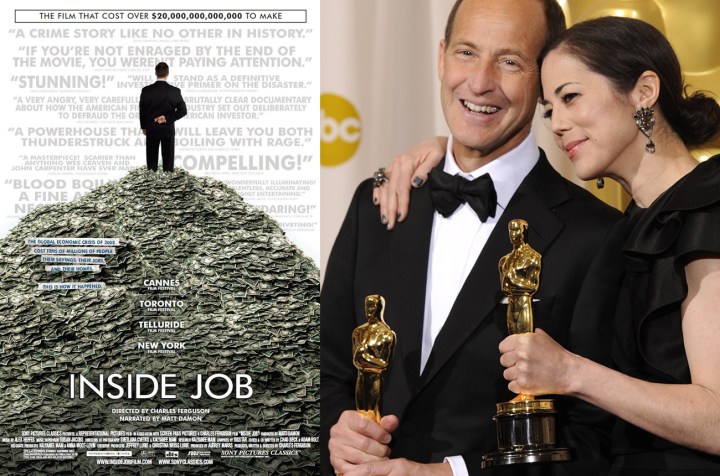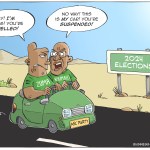Business Maverick, Media
Inside Job: The story of capitalism gone wrong, very wrong

Capitalism is a good thing. It allows the rainmakers to create and take risks. It allows people in the free world to make a difference by waking up early, working hard, creating value and hopefully making magic. But capitalism only works if there's a set of rules, a code of conduct predicated on commonly agreed principles of right and wrong. When we bend those rules and pervert capitalism, things get ugly. As they did – explosively - in 2008. By MANDY DE WAAL and RONNIE APTEKER
How will the world remember Alan Greenspan? As a financial genius, the “greatest central banker who ever lived”? Or will history write off Greenspan as the man responsible for helping create the biggest Ponzi scheme in living memory?
In 2006, when Greenspan stepped down as chairman of the US Federal Reserve, The Economist said he enjoyed “rock star” status and left office with accolades ringing in his ears. Four years later Greenspan would headline a documentary called “Inside Job”, but this film would be anything but adoring. “Inside Job” – together with what the world now knows about the sub-prime crisis – lays a heavy burden of responsibility on Greenspan (and others) for the global economic crisis.
“Inside Job” describes a system whereby Greenspan, the US government and financial institutions in a country best known for free markets and promoting a free world, played their roles in corrupting the rules of capitalism. The result was a recession that rippled around the world and left few untouched.
In “Inside Job” director Charles Ferguson tells the jaw-dropping story of how the deregulation of the American financial empire seeded its downfall. To lead in to this complex narrative of financial collapse, Fergusson tells the story of Iceland.
Watch the trailer for “Inside Job”:
Before the turn of the century, the Atlantic island country enjoyed low tax rates, was one of the wealthiest and most developed nations in the world, boasted low rates of unemployment and its government had very little debt. In 2000 Iceland’s government took the decision to deregulate its three largest banks in what “Inside Job” calls “one of the purest experiments in financial deregulation ever conducted”.
The result was disastrous. The banks revelled in excess and unchecked greed. They developed an enormous appetite for risk and went on a borrowing spree the likes of which had never been seen in Iceland before. In a few short years Iceland’s banking sector collapsed.
“Finance took over, and more or less wrecked the place,” Icelandic economist Gylfi Zoega says on film. “In a five-year period, these three tiny banks, which had never operated outside of Iceland, borrowed $120 billion, 10 times the size of Iceland’s economy. The bankers showered money on themselves, each other and their friends. There was a massive bubble. Stock prices went up by a factor of nine; house prices more than doubled. The banks set up money market funds. And the banks advised deposit holders to withdraw money, and put it in the money market funds. The Ponzi scheme needed everything it could, huh?”
This collapse could have proved an early warning signal for the US, but policy makers like Greenspan were as blind to Iceland as they were to America’s institutional memory. The Great Depression that lasted four cruel years, ended in 1933, and only really beaten by the advent on World War II, appeared to leave no lasting lessons.
The tragedy brought home by watching “Inside Job” is the realisation that the global financial meltdown that saw millions of ordinary consumers lose their homes, jobs and savings, was entirely avoidable.
“It was a completely avoidable crisis; indeed, for 40 years after the reforms following the Great Depression, the US did not have a single financial crisis,” says Ferguson. “However, the progressive deregulation of the financial sector since the 1980s gave rise to an increasingly criminal industry, whose ‘innovations’ have produced a succession of financial crises. Each crisis has been worse than the last; and yet, due to the industry’s increasing wealth and power, each crisis has seen few people go to prison. In the case of this crisis, nobody has gone to prison, despite fraud that caused trillions of dollars in losses.”
Watch Charles Ferguson being interviewed by Charlie Rose:
To show how people like Greenspan created an environment that made the sub-prime crisis possible, Fergusson introduces viewers to ‘Reaganomics’. The Reagan administration thought deregulation was a great idea, and in 1982 the change in economic policy enabled financial companies to use depositor funds to make risky investments for the first time. In the documentary, TV journalist and editor of NBC Nightly News Tom Brokaw calls this “the biggest banking heist in our history”.
Thousands of financial executives went to jail during this time, one of the worst culprits being Charles Keating. In the mid-eighties Keating took over the Lincoln Savings and Loan transforming it from a $1 billion savings, loan and mortgage business into a $6 billion high-risk investment company. Elderly depositors were urged to purchase high-risk, uninsured bonds that became absolutely worthless when Keating’s scheme imploded.
Before his scam unravelled Keating was under investigation and hired an economist called Alan Greenspan to write to regulators and say he approved of Keating’s investment scheme. Greenspan got $40,000 for his services. When the flawed scheme went belly up Keating went to jail, but Greenspan was rewarded by being taken into government under Reagan’s wing.
Greenspan was a renowned free market fundamentalist and the deregulation process he was involved with under Reagan endured through to Clinton and Bush. “Inside Job” shows that Greenspan so avidly supported deregulation that it would blind him to the law. “Inside Job” says Greenspan even ignored banking mergers that “violated laws passed after the Great Depression, which prevented banks with consumer deposits from engaging in risky investment banking activities.”
In an unregulated market Greenspan and his cohorts believed that banks and other financial institutions would do the right thing by “self-regulating”. Reality proved them wrong. The sub-prime vehicle was created by deregulated banks, and mushroomed from a $30 billion-a-year industry to more than $600 billion a year in just a decade, creating the world’s biggest Ponzi scheme. Financial institutions did anything but “self-regulate” – they luxuriated in greed and excess.
Warning bells sounded loudly about the same time that Greenspan stepped down. Shortly afterwards the market for complex derivatives collapsed, and banks were left with billion-dollar loans that couldn’t be unloaded. Global investment giant Bear Stearns ran out of money and was bought for next to nothing by JP Morgan Chase, while home loans leviathans Fannie Mae and Freddie Mac had to be taken over by the government. When Lehman Bros ran out of cash and went belly up in September 2008, the writing was on the wall.
As blood flowed on Wall Street, the owners and leadership of financial institutions walked away from the crisis with their personal funds relatively untouched. Ordinary folk like pensioners were completely wiped out and left destitute. Government bailouts arrived and as they did banking leaders awarded themselves bonuses and flew themselves off to luxury spas to deal with the “stress”.
The US government would appoint a Financial Crisis Inquiry Commission whose final report would blame deregulation for the crisis. Time magazine pointed its finger directly at Greenspan who would refuse to accept blame, but would go as far as to say that his faith in deregulation had been “shaken”.
“Inside Job” won the 2011 Academy Award for best documentary and Ferguson would use his acceptance speech to lambast Wall Street and the financial industry. “Forgive me, I must start by pointing out that three years after our horrific financial crisis caused by financial fraud, not a single financial executive has gone to jail, and that’s wrong,” Ferguson said to an audience that burst into applause.
Perhaps the audience applauded because they understood the truism that money made by hard work and risk taking should always be celebrated. But money made by exploiting legal loopholes is a tragedy that demands accountability. If a repeat of this sub-prime debacle is to be avoided it means that the greedy and corrupt must be brought to justice.
What “Inside Job” shows is that the art of hedging funds is not an act of industrial creation or generating real business value. It is simply about the manipulation of numbers, and the exploitation of loopholes. If the world’s hedge fund managers disappeared tomorrow, would anybody care? There is value in financial consultants and money managers, but when money managers create events that leave them with millions of dollars in their personal accounts and those they were meant to be looking after are destitute, what is there to celebrate?
The disaster we’ve all been left with is a system that hasn’t altered despite the sub-prime crises and subsequent global financial meltdown. No one has taken accountability, no one was punished and the fat-cat culture of taking without making or creating real value has not stopped. The real kicker is that the fat cats who accumulated so much money took no risk! Their real skill is in perverting capitalism and destroying trust.
Anyone can make a big profit in the short term with twisted accounting practices. This leads to the seduction of massive bonuses based on phantom profits in an unsustainable business system that’s just begging ultimately to collapse. Regulations can serve to protect and as America clearly showed the world, deregulated financial markets failed because greed got the better of everyone. The question these days is not if, but when will the next crisis hit? DM
Read more:
- The whole sorry business in FT;
- Lunch with the FT: Alan Greenspan in FT;
- Inside Job: how bankers caused the financial crisis in The Guardian;
- Hearing things in The New Yorker;
- Can Inside Job Explain the Financial Crisis to America? In Vanity Fair.
- Watch “Inside Job” winning the Oscar for best documentary.
Main photo: Inside Job poster and Charles Ferguson (L) and Audrey Marrs (R) pose backstage with their Oscars for for Best Documentary Feature for the ‘Inside Job’ backstage at the 83rd Academy Awards in Hollywood, California, February 27, 2011. REUTERS/Mike Blake

















